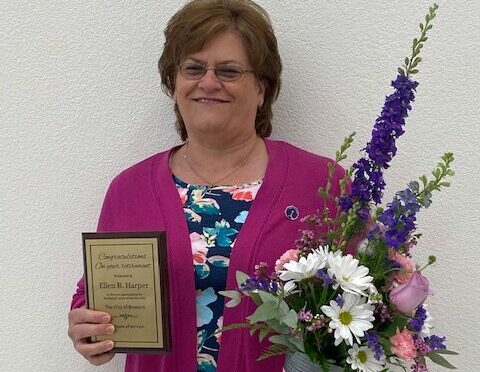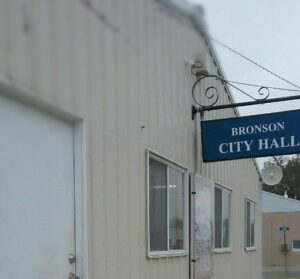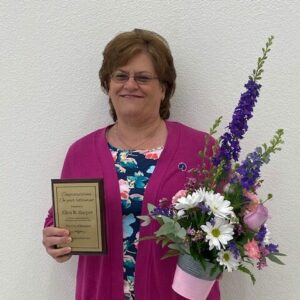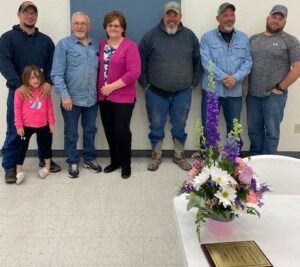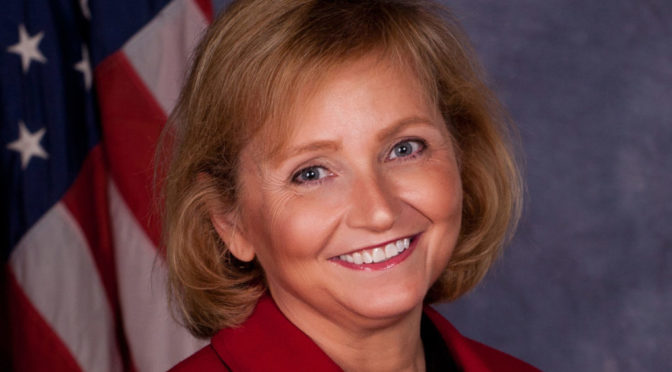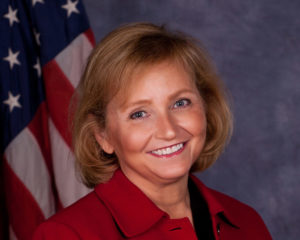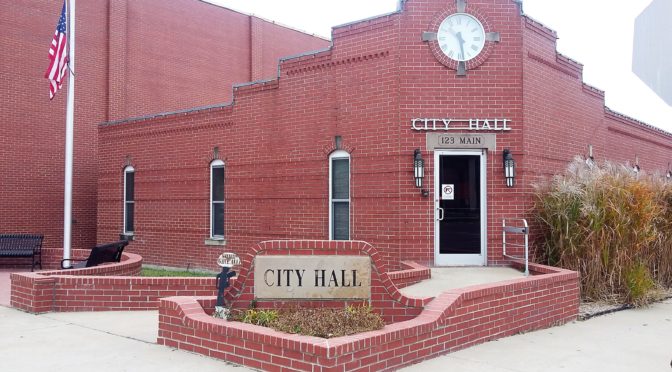April 13, 2021 Tuesday 9:00 am
The Bourbon County Commission met in open session with all three Commissioners, the County Counselor and the County Clerk present.
Also present were the following, (some were present for a portion of the meeting and some were present for the entire meeting); Jason Silvers with the Fort Scott Tribune, Mr. & Mrs. Clint Walker, Susan Bancroft, Bill Martin, Ben Cole, Mark McCoy, Anne Dare, Kim Simons and Mary Pemberton.
Clifton made a motion to approve the minutes from the previous Commission meeting, Jim seconded and all approved and signed the minutes.
Lynne made a motion to approve a culvert permit for Dale Bollinger on Grand Road, Jim seconded and all approved.
Eric Bailey reported they had hauled off scrap metal from the Landfill last week. He said he is getting some interest in the telephone poles there.
Eric said they were doing pothole patching last week on Maple as well as in the Garland area, he said they will be doing this on Maple west of 3 Highway today.
Eric discussed the low water crossing at 60th & Grand; he said they replaced the metal tube, they are putting rebar in and poured the footing and slab there.
After repairs were made, they are crushing at the Beth Quarry again today.
Eric said the bridge west of the 7 & 39 junction is closing this week and KDOT has planned alternate routes; Eric said the County is surveying the roads in case there is excessive traffic on the County roads and damage occurs.
Windmills – Eric said the company is working on 3 & 39 Highway on the South and West side capping the roads, he said they are 20+% complete. Eric said there was a dust issue this morning and said water was being put down on the roads and they were getting the trucks to slow down. He said on 20th North of 39 Highway they are seeing some rutting. The company has been cleaning dirt and mud off of the roads.
Eric said he has located some trucks on Purple Wave to replace the one that was wrecked; the Commissioners questioned the kind, miles, year of the trucks, Eric said he would find out the data.
Jim said the County did a great job working on a ditch he reported; Jim said he has been emailing or texting road issues to Eric and said Eric is doing a good job fixing the problems.
Eric said they have been ditching @ 105th & Quail Road.
Lynne reported water going through the road in an area of Unity ½ mile west of 105th.
Lynne said he would like to set up a group of individuals to work with him and others including Rene’ Ludwick to identify activities for under privileged kids; Clifton thought it was important to involve Tom Robertson from Buck Run in this and Jim suggested involving the school counselors in this. Jim said he had his blessing to pursue this.
Lynne said he would be working with SEK Regional Planning Commission regarding the CDBG grant.
Jim Harris said the Consolidate Rural Water District #2 had contacted him requesting assistance with a grant, Jim made a motion for Lynne to contact BEDCO for help with the application process and said they were in support of the grant application for Rural Water District #2, Clifton seconded and all approved.
Lynne discussed the approximate $90,000 bill for the repairs to the front steps of the Courthouse; Lynne asked if they wanted to pay this out of General or out of the 1 cent jail sales tax, Justin verified that they could use the jail sales tax for this expense. Clifton suggested if they have other money in the General fund to use they should use it instead of using the jail sales tax money. Clifton made a motion to pay the bill out of the General fund, Jim seconded and all approved.
Lynne said he had received phone calls regarding the SEK Multi County Health Department; he said the other 3 counties that are a part of the SEK Multi County Health Department are staying with the SEK Multi County Health Department and said if Bourbon County didn’t stay they wouldn’t be able to do this since rely on the money from Bourbon County’s participation. Jim said he didn’t think Bourbon County wanted to abandon the Health Department, but questioned if anyone had ever done a study to do a stand-alone health department on our own? Clifton suggested this cost would be well over $200,000. Clifton said CHC had been working to try to provide this service to us, Jim said a lot of people use the Multi County Health Department for health services and said he didn’t want to cut any services for the residents. Lynne recommended that Bourbon County continue with SEK Multi County Health Department as it is and said the contract with them comes up in May. Clifton asked if the County was going to allow CHC to do a presentation, Lynne said they can, he suggested that Clifton contact CHC and to schedule them for a presentation on next week’s agenda.
Lynne made a motion to go into a 15 minute executive session for KSA 75-4319(b) (2) for consultation with an attorney for the body or agency which would be deemed privileged in the attorney-client relationship regarding possible litigation, the Commissioners will meet in another location and reconvene in the Commission room at 9:40, Jim seconded and all approved, (the session included the Commissioners and Justin Meeks). At 9:40, Lynne made a motion to come out of executive session and resume the normal meeting, Clifton seconded and all approved. Lynne made a motion that they have a special meeting on Friday, April 16th at 8:30 am regarding BWERKS, Jim seconded and all approved.
Justin Meeks discussed the tax sale, he said they have filed 50 petitions in the last two days. He said they may need to have more than one tax sale this year and said once the petition is filed the owner would have to pay all of the back taxes to redeem their property.
Public Comment: Anne Dare said a patron had contacted her and questioned if the Commissioners had ever considered using online sources for HR issues; she said this would be an unbiased person. Anne gave the Commissioners a report from KOAM regarding American jobs plan, she said they rated each state and Kansas received a grade of “C”. She question who Rene’ Ludwick was; Lynne said she is from here and does social work. Anne said she contacted the SEK Multi County Health Department and asked them for a total number of people who had been vaccinated against COVID in Bourbon County; she said they couldn’t answer this since others are also offering the vaccine in Bourbon County, she said someone should know this number. Clifton said people giving this vaccine would report to KDHE and said KDHE is responsible for giving this number out.
Susan Bancroft said the appraiser had extra money left in the 2020 budget and asked that it be moved to the appraiser capital outlay fund; Jim made a motion to allow the appraiser to work with Susan to move the $20,000 from the 2020 appraiser budget to the capital outlay fund, Clifton seconded and all approved.
Susan said she is getting close to having the County ready for the 2020 audit.
Bill Martin requested a place be put on the agenda to allow elected officials to come before the Commission board. Bill asked if the County could use a teleconference call instead of coming in to see the Commissioners, Lynne said they would have Shane Walker set this option up. Bill discussed the HR position that has been discussed; he said he has heard the comment of paying 60-80,000 for an HR person; he said he would be sending some of his staff to HR training and suggested paying them additional money for the added extra HR jobs. Bill said he has over 100 HR directors – referring to the other Sheriff’s in the State that rely on each other with HR issues. Lynne asked that a place for elected officials to meet with the Commissioners be placed on each agenda prior to the County Counselor Comment. Susan said that CrawKan can provide the County with an option to have conference calls for the Commission meeting and said that KCAMP offers a lot of HR resources. She said it requires extensive training to get certified in HR.
Mary Pemberton said she would like the Commissioners to expand on an issue previously discussed; she said it was stated that the only way to reduce the mill levy is to increase the valuation. She discussed the past increases in the valuation and said at times they have kept the same mill levy, meaning that peoples taxes are increasing, even though the mill levy wasn’t increased. Mary said she would send data to the Commissioners about this. Mary said when the PILOT money was previously discussed it was told it would reduce the mill levy, she said she has heard the Commissioners say (when discussing how to pay for something) they could use the PILOT money. She encouraged the Commissioners to use the PILOT money to help lower taxes.
Bill Martin suggested asking the EMS, Sheriff and Emergency Management what equipment they needed to make their job more efficient and then use the PILOT money for this. Bill said it would cost $50,000 to replace the aging video equipment in his department. Jim said they are getting close to starting the budgeting process and said their goal is to lower the mill levy.
Commissioner Comment: Jim said last week it was requested that he contact KDHE regarding the old landfill site. He said the wells on this land must be tested until 2039. Lynne questioned if the land could be built on, Jim thought it could and said the owner would have to do drilling, Clifton asked who was responsible for the testing, the County or the new owner, Jim said KDHE said if the County sold the land they would transfer the testing to the new owner. Jim said he would contact KDHE for more details.
Jim made a motion to suspend the meeting until 10:30, Clifton seconded and all approved.
The Commissioners attended a KOMA ZOOM video training with the Kansas Attorney General’s office. Phillip Michael presented the following data… “Kansas Open Meetings Act
K.S.A. 75-4317 et seq.
KOMA issues/concerns
Executive sessions
Improper motions for executive sessions
Calling an executive session for one reason/subject, then discussing
different subject matter in session
Inclusion of non-Commission/Council members in executive sessions
Extending an executive session without reconvening the open meeting,
making a motion and voting
Failure to return to open meeting at the stated time/place after
executive session
Revealing information discussed in executive session
Serial communications
Majority of membership of public body gathered together without notice
Failure to provide notice of meetings
History of open meetings
K.S.A. 19-218 – Every board of county commissioners “shall sit
with open doors, and all persons conducting in an orderly
manner may attend their meetings. . . .”
First adopted in 1868; last amended in 1923
KOMA adopted in 1972; provides rules that allow members of
the public to observe the nearly 4,000 units of government in
Kansas making decisions
Policy, construction, purpose
K.S.A. 75-4317(a) – Meetings shall be open to the public
because “a representative government is dependent upon an
informed electorate. . . .”
Law enacted for the “public benefit,” so construed broadly in
favor of the public to give effect to its specific purpose of
openness. State ex rel. Murray v. Palmgren, 231 Kan. 524,
Syl. ¶ 4 (1982)
KOMA interpreted liberally and exceptions applied narrowly to
carry out purpose
Who is subject to KOMA?
All legislative and administrative bodies and agencies of the
state and political and taxing subdivisions thereof, and other
subordinate groups thereof receiving or expending and
supported in whole or in part by public funds
K.S.A. 75-4318(a)
“Subordinate groups” – not defined; if created by a covered
entity or the group has become an extension of a covered
entity, most likely covered
Who is subject to KOMA?
State bodies
State Legislature, its committees and subcommittees unless the rules
state otherwise
State administrative bodies, boards and commissions
State Board of Regents
Supreme Court nominating commission
Local Governments
Cities, counties and townships
School districts
Fire districts
District judicial nominating commission
Who is not subject to KOMA?
Any administrative body when exercising a “quasi-judicial”
function – K.S.A. 75-4318(g)(1)
Hearings conducted under the Kansas Administrative Procedures
Act (KAPA) – K.S.A. 77-523(f); K.S.A. 75-4318(g)
Judiciary
Private organizations
Staff meetings of a covered entity
What is a meeting?
Any gathering or assembly in person, through the use of a
telephone, or any other medium for interactive
communication
By a majority of the membership of a public body or agency
subject to the act
For the purpose of discussing the business or affairs of the
public body or agency
K.S.A. 75-4317a
Gathering or assembly
May conduct meetings by telephone or other medium
(conference call, video, skype, go to meeting, WebEx) if comply
with all KOMA requirements
Informal discussions before, after or during a recess of a public
meeting may be subject to the KOMA
Name of the gathering is irrelevant
Majority of the membership
Next whole number greater than one-half the total number of
members
Can be different than a quorum
Discussion
Binding action or voting not necessary
Meeting includes all gatherings at all stages of the decision
making process
Social gatherings
Retreats and meetings held in private
Educational conference/seminar
Tip – when traveling to such meetings, advise members of
public body to avoid discussing business or affairs
Notice
KOMA does not require notice of meetings to be published in a newspaper or
on a website
Must request notice of meetings
No formalities to requesting notice – can be verbal or written
A request is valid for one fiscal year
Must notify of expiration before terminating notice
Presiding officer has duty to provide notice, but duty may be delegated
Provide date/time/location where public body will meet to person requesting
notice a “reasonable time” before meeting
Group request for notice – provide to designated individual
K.S.A. 75-4318(b)
Example
Six member city council plus mayor
Mayor and four council members attended a Town Hall meeting
Mayor and four council members discussed city business
including concerns over utility increases, a new parking lot and
rumors
No notice to those who requested notice of all city council
meetings
Violation?
Example
Yes, a KOMA violation occurred
Met the definition of a meeting
Failed to provide notice of the date, time and place of the
meeting
Penalty
Obtain at least one hour of KOMA training
Individually pay the cost of obtaining training
Not engage in any further violations
Penalties
Civil penalty up to $500 for each violation paid by each
individual member of the public body who knowingly violates
Require completion of AG approved training
Order to cease and desist from further violation
Comply with the KOMA
Reasonable expenses, investigative costs and attorney fees
“Serial communications”
Interactive communications outside of a noticed meeting may be a meeting
under KOMA if:
Collectively involve a majority of the membership of the public body or
agency
Share a common topic of discussion
Are intended by any or all participants to reach an agreement on a
matter that requires binding action to be taken by the public body or
agency
K.S.A. 75-4318(f)
Emails, calling trees, use of an agent (staff member)
Tip – DO NOT REPLY ALL, DO NOT FORWARD
Meeting conduct
KOMA does not address meeting procedures
Agenda
Not required to create
Any agenda must include topics planned for discussion (if
known) but may be amended during a meeting unless a
statute or rule prohibits an amendment
Must make agenda available to any person requesting the
agenda
Agenda does not have to be mailed out in advance of meeting
– may simply place the agenda in a public place
Meeting conduct
Use of cameras, photographic lights and recording devices
Public may record meeting as long as not disruptive
Use subject to reasonable rules to ensure orderly conduct of
the meeting
No public right to speak, but only to listen and observe
Location of meeting – is it accessible to the public?
No secret ballots
Minutes – only required to record motion to go into executive
session, but bylaws, ordinances, policies, etc., may require
minutes to be kept
K.A.R. 16-20-1
Compliance with the Kansas Open Meetings Act during an
emergency declaration.
Applies to the use of electronic medium of communication to
conduct an open meeting
When the public body is meeting electronically only
When the public body is meeting in person, but the public is
not allowed to attend the meeting in person
What does a public body need to do to comply with the KOMA
Executive sessions
Permits discussion of certain enumerated matters outside of
public view
An open meeting must be convened first and then recess into
executive session
The KOMA does not allow an executive session to be extended
or ended early
No binding actions may be taken in an executive session, but a
consensus is allowed
If a consensus is achieved, an open and formal vote must be
taken in open session
Example
City Council held a special meeting. During the special meeting,
the council recessed into executive session. While in executive
session, the council reached a consensus to terminate the
employment of a City employee.
While in executive session, the council told the employee they
were terminated and to collect their belongings and leave.
Thereafter, the council resumed its public meeting, but failed to
hold a public vote to terminate the city employee’s
appointment.
Violation?
Example
Yes, a KOMA violation occurred
Yes, the council took binding action during its executive
session
Penalty
Obtain at least one hour of KOMA training
Not engage in any further violations
Executive sessions
Must be a formal motion seconded and carried; Complete
motion recorded in the minutes
Each executive session requires a complete motion recorded in
the minutes
Parts of the motion for executive session:
Statement of the subject(s) to be discussed (without
revealing confidential information)
Justification (from the statute)
Time/place open meeting will resume
K.S.A. 75-4319
Who may attend?
Only members of the public body
Mere observers may not attend
Staff, agents or other non-public body individuals have no right
to attend
Public body may invite individuals who will:
Aid the discussion
Provide information on a permissible topic or participate in
the discussion
Executive sessions
Commonly used justifications:
Personnel matters of non-elected personnel
Consultation with the public body’s attorney
Employer – Employee negotiations
Data relating to the financial affairs or trade secrets of corporations,
partnerships, trusts, and individual proprietorship (economic
development)
Matters affecting a student, patient or resident of a public institution
Preliminary discussions relating to the acquisition of real property
Security measures
K.S.A. 75-4319
Executive sessions
Justification allowed:
Personnel matters of non-elected personnel
To protect the privacy interests of the employee
Does not include independent contractors, appointments to
boards or committees, or public officers
May discuss applicants for employment
K.S.A. 75-4319(b)(1)
Executive sessions
Justification allowed:
Consultation with the body’s attorney
The attorney must be present
The communication must be privileged
No third parties may be present (breaks privilege)
K.S.A. 75-4319(b)(2)
Executive sessions
Justification allowed:
Employer-Employee negotiations
For the purpose of formal negotiations – not general
employee meetings or discussions
School boards have special rules
K.S.A. 75-4319(b)(3)
Executive sessions
Justification allowed:
Data relating to the financial affairs or trade secrets of
corporations, partnerships, trusts, and individual proprietorship
Called the economic development exception
K.S.A. 75-4319(b)(4)
Executive sessions
Justification allowed:
Matters affecting a student, patient or resident of a public
institution.
With this justification, any hearing must be open if
requested by the person involved
K.S.A. 75-4319(b)(5)
Executive sessions
Justification allowed:
Preliminary discussions relating to the acquisition of real
property
Acquisition only – not sale
Remember – no binding action in executive sessions
K.S.A. 75-4319(b)(6)
Executive sessions
Justification allowed:
Security Measures
Open discussion would jeopardize security measures that
protect infrastructure and the public; includes intelligence
information, tactical plans, resource deployment and
vulnerability assessments
K.S.A. 75-4319(b)(13)
After the training, Justin said he would collect any questions the Commissioners had and send it to the Attorney General’s office for answers.
At 11:24, Jim made a motion to adjourn, Clifton seconded and all approved.
THE BOARD OF COMMISSIONERS
OF BOURBON COUNTY, KANSAS
(ss) Lynne Oharah, Chairman
(ss) Jim Harris, Commissioner
(ss) Clifton Beth, Commissioner
ATTEST:
Kendell Mason, Bourbon County Clerk
April 20, 2021, Approved Date


